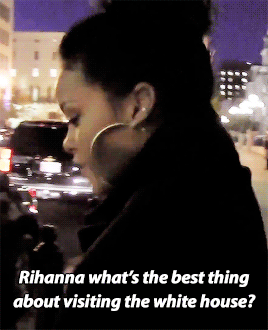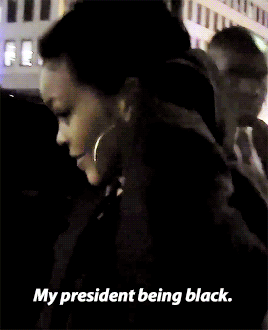Swansea-born. Living in London. Labour. Core group plus. May contain traces of socialism and homosexuality. Suitable for vegetarians.
Don't wanna be here? Send us removal request.
Text
“Voters will see I’m part of a normal family just like them”
When I think of homophobia in selection campaigns Peter Tatchell’s bid to be an MP in the early 80s immediately comes to mind, but with LGBT Labour asking NEC candidates their views on how to deal with homophobia in selections I was interested to find out how prevalent it is within the Labour Party today.
When I tried to speak to people about this, I was, to be honest, expecting people to recall stories from the 80s and early 90s. In fact, asking the first person I spoke to when his selection took place, I was stunned to get the response “2010”. It is difficult to think of the Labour Party which I champion as “the only party which can deliver equality” as having a homophobic underbelly. The stories that I have been confronted with, however, are a testament to the role homophobia still plays in internal politics. Labour members are committed to the party as the way to deliver progressive social change but they appear to be remarkably orthodox and conservative in their view that Parliament is a place for straight, white men.
Since women were allowed to stand for Parliament in 1918, 4,365 men have been elected and just 291 women. There have only been openly gay MPs since Chris Smith came out in 1984 and it wasn’t until 1997 that Stephen Twigg was the first openly gay candidate elected. The cumulative impression this has created undoubtedly perpetuates the unrepresentative nature of Parliament and makes it difficult for women, ethnic minorities and LGBT people to be taken seriously as candidates.
Despite the use of All Women Shortlists, family and children can still adversely affect a woman’s chance of getting selected, but these issues are compounded where she is also LBT. Although questions about family are banned from the official selection process, one person told me how she was asked about her marital status and plans to have children in a one-on-one and felt that being openly bisexual would have negatively impacted on her chances of getting selected. The candidate who went to win in that CLP was a straight man with a baby and the feeling from another (male, married, but childless) candidate in the selection was that the members thought heterosexual marriage and ability to produce off-spring is more important than the candidate’s politics.
In another seat, the person selected as Labour’s Parliamentary candidate in 2010 said an opponent tried to make an issue of his sexuality during the selection campaign. In leaflets she stressed being a “local family candidate” and suggested that “voters will see I’m part of a normal family just like them”. It goes without saying that the use of the word “normal” to contrast straight with gay relations ships is offensive and unacceptable. It is encouraging, however, that despite these tactics didn’t win the support of party members and the openly gay candidate went on to fight the general election for Labour.
The most outrageous example I have heard of is of a candidate who, despite not having made their sexuality known, was asked “How do you think your sexuality will effect your candidacy?” during a candidate interview. Presumably the selection committee were acting on no more than crude assumptions and stereotypes and I seriously doubt the other candidate, a married woman with children, was given a similar grilling about her sexuality.
That is not to say that the universal experience of LGBT candidates is probing questions about their sexuality and appalling jibes about “normal families”. Plenty of people have come forward to tell me that they’d been treated with “total neutrality” and one said that his only experience of discrimination was ‘positive discrimination’ trying to promote LGBT candidates.
The only question I was asked when I was selected as a town council candidate was “You’ll do it, won’t you Tom?” We didn’t have enough candidates – my sexuality didn’t come into it. However, I have seen how it can be an issue for candidates in my local party. I once called round to see a former member with a local councillor to ask if they’d consider rejoining the party. He seemed keen on coming back to Labour after a decade-long break and went on to tell the circumstances that led to him leaving the party. Apparently, he’d resigned his membership in a row over a council seat he wanted, but didn’t get selected for. The person who became the candidate was “a poofter”, he told us.
These incidents, I hope, are limited but reflect the challenges that LGBT hopefuls face in getting selected. In many cases it seems that party members are far more concerned with your personal life than your politics when deciding how to vote.
In Government, Labour legislated to prevent homophobic discrimination in the work place. It is now time we got our own house in order. The newly elected NEC must take action to ensure that alleged homophobia is taken as seriously as other forms of discrimination and ensure that proper procedures are in place to deal with it. Labour has done so much to end the era of a Commons filled with straight, white men, but, with only one out lesbian on our benches, there is no room for complacency.
This blog was written in June 2012 and originally published on the now-defunct ‘Cllrsontour’.
2 notes
·
View notes
Video
youtube
0 notes
Photo
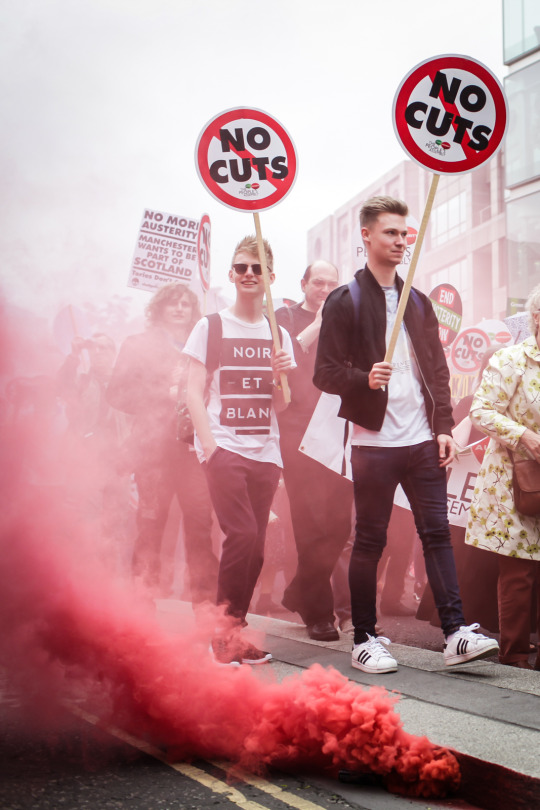
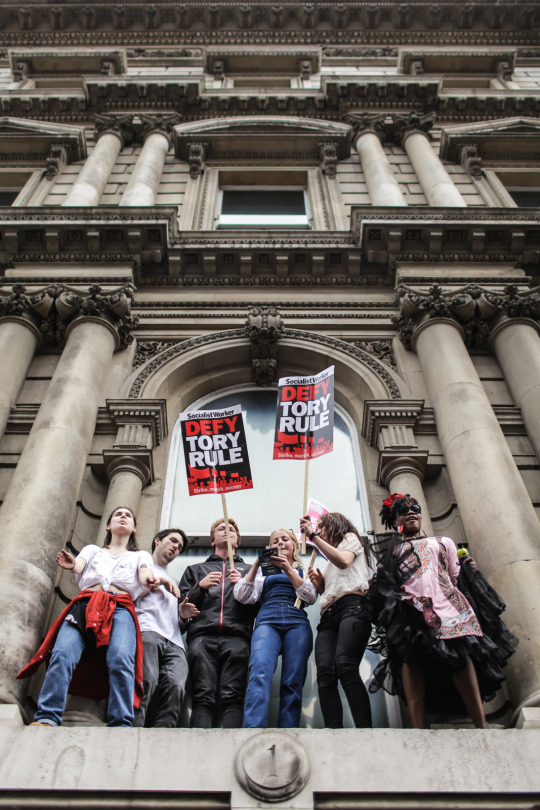

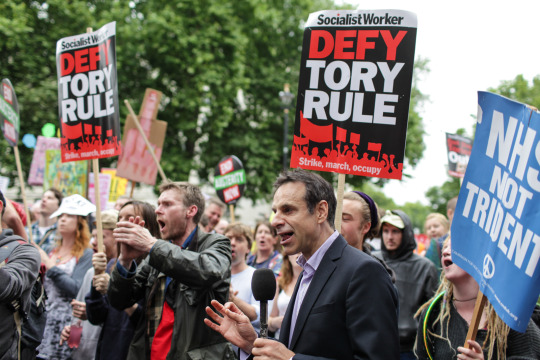
London, United Kingdom: An estimated 250,000 people march through central London as part of the ‘End Austerity Now’ demonstration against government spending cuts.
1K notes
·
View notes
Photo

Hillary's campaign has a Spotify playlist - Does she really listen to Ariana Grande? https://open.spotify.com/user/hillaryclinton/playlist/43JJ50RsHoyUXj8eI8FaPQ
0 notes
Photo

Interview: From SOAS to City Hall? David Lammy addresses Labour's 'real challenge' in his bid to lead London http://bit.ly/1ELQ8fc Photo: Policy Exchange
0 notes
Text
Can’t see the Wood for the trees
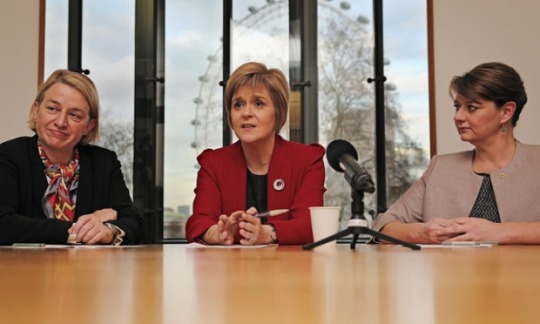
In 36 hours, Leanne Wood will have an opportunity no other Plaid Cymru leader has before: a platform alongside the leaders of the UK’s major parties in an election debate that will surely be watched by millions.
Yet despite this apparent achievement, Wood has few reasons to be cheerful.
The party has certainly come a long way since they delivered a “quiet earthquake” in the first devolved elections; shocking commentators by scooping up nearly a third of the vote. Today, ‘the party of Wales’ comes fourth in national polls - behind UKIP - with only 1 in 10 Welsh voters saying they’ll back Plaid.
While the nationalists in Scotland look set to smash Labour dominance, Plaid will just be hoping to get their three current MPs returned to Westminster. There seems little prospect they’ll be able to challenge even the Liberal Democrats in a Welsh-speaking west Wales constituency they comfortably held from 1992-2005, never mind making a dent in the South Wales valley seats where they were able to oust Labour in 1998.
No wonder, then, that Nicola Sturgeon looked so uncomfortable to be sat alongside the underwhelming Plaid leader at a joint Westminster press conference a few months ago. After May 7, the SNP will likely be kingmakers, Leanne will be lucky to get a look in.
On the day of the party’s manifesto launch, its former leader Dafydd Elis-Thomas summed up the position Plaid finds itself in; saying, unlike their Scottish counterparts, Welsh voters “clearly haven’t been convinced that we [Plaid] are a better alternative” to Labour.
As for its long term ambition for an independent Wales, already a long shot, Plaid seem to be faring even worse under Wood’s leadership. An opinion poll conducted following the Scottish referendum found support for Wales becoming an independent country had plummeted to a record low - just 3% wanted to break away from the UK. Despite this, their general election manifesto sets out demands for a further 18 powers to be devolved to Cardiff Bay.
Things weren’t supposed to be this way. Back in 2012, Plaid elected Wood as the leader to challenge Labour. From a South Wales mining community, the party’s first leader who didn’t speak Welsh, and the first in over two decades to call themselves a socialist, it was hoped she could reach out beyond Plaid’s rural, welsh-speaking base. But just six weeks into the job, Wood’s party lost control of their only local council. In the 2014 European elections, they managed to cling on to their single MEP by a whisker.
If voters tune in on Thursday evening expecting to find Plaid represented by a fire-breathing Nicola Sturgeon, they’ll be left wanting by a lacklustre Leanne. A national platform is supposed to be the Holy Grail for minor parties, but for an underperforming Wood it may prove to be a poisoned chalice. Her only hope is that perpetual ‘Ozzyshambles’ Natalie Bennett makes her look inspiring by comparison.
#plaid#plaid cymru#party of wales#wales#ge2015#election#indyref#snp#nicola sturgeon#leanne wood#leadersdebate#battlefornumber10#cymru#welsh nationalism#welsh independence#devolution
0 notes
Link
0 notes
Photo





I’m seeing a bunch of people do a “6 selfies of 2014” thing, so I figured I’d do it!
I don’t take many selfies because I hate how I look as a boy and I rarely get a chance to dress as a girl, so I’m only posting 5, but this year was a big year for me. Thank you all for being kind and supportive!
358K notes
·
View notes
Text
'SOAS is unusual. It’s a very unique institution’
Paul Webley, Director of SOAS, speaks to Tom King about the changes and challenges that face the School
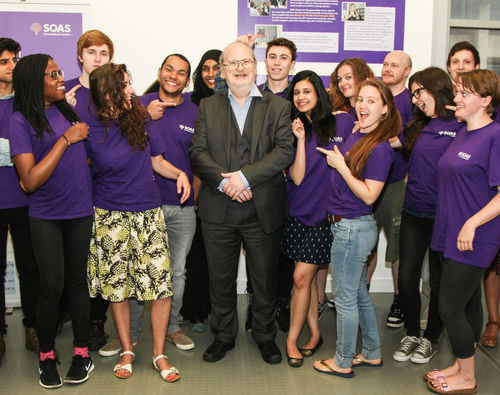
This summer marked eight years since Paul Webley took over the directorship of SOAS; a period that has seen considerable change to the School, and the university sector as a whole. “The transformation to what is essentially a marketised higher education system is really quite stark...the level of competition that produces is huge,” he tells me.
When he arrived, Professor Webley says, “SOAS was indeed regularly making, not big losses, but losses every year, and the first thing I was told by Governing Body was ‘we’re projecting a loss next year, could you please turn it round’.” He did and the School is now, for the most part, running annual surpluses, which Webley says has allowed for investment in upgrading facilities. But he says the most surprising thing was that SOAS lacked a sense of purpose. “SOAS didn’t seem to know what it was doing. I was really surprised. SOAS is unusual. Its a very unique institution; small and specialist. It must know what its doing. But it didn’t.” Webley set to work producing a vision for what SOAS is all about and says that people now have a clearer idea of the School’s purpose.
Before joining the School, Webley had spent 26 years at the University of Exeter rising to Head of the School of Psychology and, finally, Senior Deputy Vice-Chancellor. He originally studied for his undergraduate and postgraduate degrees at LSE and his research explored the contribution that psychology can make to economics; he is a member of the Journal of Economic Psychology’s Editorial Board.
Looking to the future, Webley identifies a number of challenges for SOAS in an increasingly competitive higher education sector. “We’re in a system now which is very volatile and highly competitive,” he says, with a risk that other universities are trying to move into SOAS’ niche. “For years, what we did, we did distinctly and no-one else did, but what you’ve seen in recent years is other universities both within and outside London introducing Chinese degrees, setting up India institutes like King’s and LSE setting up a Middle East institute.” Does this mean SOAS will have to compete by shifting focus from language courses like Hausa, which are expensive to provide, to ‘cheaper’ degrees? “We see ourselves as an area-based university,” he says, “which has to be informed by languages. That’s what makes us distinctive...if we stopped doing those things, we’d stop being SOAS.” The challenge, Webley says, is the balancing act of cross-subsidising degrees which are more costly from those that are cheaper to put on. However, this can only go so far; “In a market system you respond to the student demand, what else are you supposed to do.”
This year SOAS hasn’t grown in terms of student numbers, in fact the number of undergraduates is down for the first time. A substantial proportion of this year’s intake were recruited through ‘Clearing and Adjustment’; the last minute system for students to apply for spare places at the end of August. So, is SOAS able to attract enough students to sustain itself? “This year was our trickiest year.” Webley tells me, “but do I think we’re doing something that is attractive to students? My feeling would be yes.” Failing to bring in more students will have consequences for SOAS’ coffers, however, so will we be lowering entry requirements to ensure student numbers? “Its all a matter of degree, how flexible are we prepared to be? We’re prepared to be slightly flexible, but we’re not going to admit people here who couldn’t succeed on degrees.” Webley adds that “There’s always a trade off between these two things. We’ve got to maintain the quality of intake, because we want to make sure we have good students who are able to benefit from the education we offer. On the other hand, if we were talking about a one-off year that you were going to be losing money, we might be prepared in this particular year to be flexible to make sure we’ve got the money.”
This year SOAS has slipped in some league tables, which rank universities on a number of variables. Professor Webley says “We actually went up last year about as much we came back down again this year...its not fair to say there’s been a trend downwards.” He adds that “the SOAS league table is very unusual” in that most universities have broadly similar scores on each of the criteria being assessed. “Ours are all over the place. We might be in the top ten for this and then we’re 50th for that.” What can SOAS do to improve its student experience and boost its standing in league tables? He says it’s important that where SOAS has established expectations, like on three week essay turnaround, the School needs to deliver. The personal tutor system is also an area Webley feels is in need of improvement; “when I talk to students I get quite a variable impression, some say it was great, some say I’ve never known who my personal tutor was.” There’s a need to make sure the pastoral network forms a consistent safety net for students, he tells me.
Some university leaders have said the market logic in higher education should be followed to its obvious conclusion by lifting the cap on fees for home and EU students so that each institution can set its own rate, and potentially bring in extra income. Webley, however, is not one of them, but he does have concerns over current funding arrangements. “There is a bit of a concern, because what we’ve got, almost certainly, is a system that’s not sustainable...but also that is constraining our income in a serious way. We’ve got a £9,000 cap which doesn’t go up each year. When the cap was £3,000 it went up each year [in line with inflation] and it got up to £3,600, £3,700...even with low inflation we’ve got to the point where the £9,000 fee is worth less.” So while he doesn’t want the cap lifted, Webley says that the lack of inflationary rises is causing a problem. Will it fall on international students to pay even higher fees to make up the difference? “Well, it means we have to raise the income we have to raise.”
So what is it that Professor Webley does on a day-to-day basis? “Usually lots and lots of meetings”, he tells me. “What have I done this morning? I’ve had a pre-meet to discuss a meeting, another pre-meet to discuss a meeting, the meeting itself, which was Executive Board.” and, of course, managing a constant stream of emails. Generally, Webley says his role consists of three things; managing, leading and representing SOAS. This is everything from meeting with ambassadors and taking decisions on staff promotion to providing an overall vision for the School and selling us to the outside world.
Resting behind his desk is a hard hat - emblazoned with SOAS’ new golden tree - and a pair of sturdy-looking boots, a nod to the development that is surely dominating the landscape both metaphorically and literally - Webley’s office has a direct view over the Senate House building site. He says he’s extremely disappointed the project has been held up and now fears completion may be pushed back to Spring 2016. However, the timing may prove fortuitous; the grand opening, pencilled in for June, will be just in time for SOAS’ centenary celebrations. “Seizing an opportunity out of something that’s very irritating”, as Webley puts it. Students will also perhaps be relieved that a move midway through the academic year now seems unlikely.
The move to North Block has thrown the future of Vernon Square into doubt. It still seems likely that the building will be sold off, but Webley recognises that real estate in central London, which the School owns outright, has the potential to be an asset worth hanging on to. One proposal has been to transform the campus into a new student halls to provide accommodation that SOAS is sorely lacking. “That doesn’t seem feasible in terms of the planning,” Webley says; Islington Council are not keen on having any more student halls in the area. Nonetheless, Webley tells me, “We need to find a solution for student residences long term. There just aren’t enough places.”
Not only are there too few places currently, but eventually the agreement which guarantees rooms for SOAS students at the Sanctuary-run halls on Pentonville Road will expire. The halls, previously owned by the School, were sold off before Webley’s time - a decision he feels was a mistake - and he indicates that his preference in future would be for halls run and owned by the School. “My take on student residences is that I don’t quite understand what the need is to involve private providers in them at all.” Webley says, “If it works, if you can run your halls of residence so that you charge a sensible sum for them that covers the costs of them and makes a nice surplus to cover other things, why can’t you run them yourselves?”
More immediately, what is SOAS doing about the cockroach infestations, broken showers and mice running round kitchens at Dinwiddy? “We have striven mightily in the past to do something about this, the problem is...we have no say in the matter” Professor Webley says “We have all the responsibility but no power, we can do nothing. We can talk to them but the relationship is between the students and the Sanctuary management.”
Last year, saw substantial disruption to the School’s running, for a number of days the main building was effectively closed down, due to staff’s strike action over pay. Professor Webley says these were part of a national pay dispute and “it’s not surprising that after a number of very low years of pay increases, all of which were less than 1%, that actually employees were looking for a larger pay rise...nor does it seem to me surprising that on the other side of the coin for the institutions to be saying….we haven’t actually got the money...its a consequence of less money coming into universities.”
The cleaners’ and fractional teaching staff disputes are about SOAS though. Webley says he’s not optimistic about the ‘shared services’ model that would see cleaning staff employed by a company across a number of University of London colleges. In any case, this option was not favoured by the Justice for Cleaners campaign, which wants to see cleaners directly employed by SOAS. The issue, Webley claims, is not about outsourcing, but about terms and conditions. “We have a large number of outsourced contracts and I actually find it slightly irritating when people focus on the issue of cleaners...cleaners do not have the worst terms and conditions of any staff here at SOAS...its actually the security staff.” He says Governing Body are seeking to improve the employment conditions of outsourced staff and this will be done “over time”. On the fractionals’ campaign, he says, “we put a lot of time into negotiations...its clear that at least some fractional staff are not happy with the outcome. We have offered improved terms and conditions this year.” Its clear that the Fractionals for Fair Play campaign, as well as Justice for Cleaners, are set to fight on.
Now, barely a six weeks into term and the higher education union, UCU, has imposed a marking boycott that could mean students receive no formal feedback or marks until a deal is struck over planned pension changes. Webley thinks the action is premature and should be suspended until negotiations have progressed further. He repeats the line that SOAS use in every dispute: “Our priority is to minimise the impact on students,” and says it is likely staff will try to provide as much feedback to students as possible within the framework of the boycott. Does he have any concerns about the proposals that could see staff’s pensions slashed by as much as 27%? “We send our view off to UUK [Universities UK] which is the negotiating body for us, we may disagree with what people say… [but] its not helpful for people to break ranks.”
Originally published at The SOAS Spirit.
#SOAS#Paul Webley#UCU#Marking Boycott#Housing#Students#Tuition fees#Higher education#University#Dinwiddy House#Dinwiddy#Senate House
4 notes
·
View notes
Link

I love Christmas music.
No, I know everyone (mostly everyone) says they love Christmas music.
But I REALLY love Christmas music.
I’m the sort of person who would listen to Christmas all year round. If it wasn’t for my deeply superstitious nature drilled into me by my Spiritualist...
1 note
·
View note
Text
The business of education: STEM postgraduate loans

Undergraduate student loans were an awful idea. Not least because they scrapped a system where people could get a degree for free but also because they now pay for fees which have been hiked to an eye-watering £9,000 a year and have created a huge black-hole in government finances as it turns out graduates can't afford to pay back their mountains of debt.
Having not learnt from this disaster and come to the conclusion paying for higher education out of general taxes would be better, the government is set to announce a roll-out of student loans for people on postgraduate courses.
Not to make the best the enemy of the good, providing student loans for masters courses will greatly improve access for those who don't have a spare £3,000-£41,000 to pay upfront for a one year course.
However, there's a catch. It's expected the loans will only be available to those studying science, technology, engineering or maths (STEM). Anyone wanting to study arts, humanities or a language will have to carry on passing the cap around.
This comes as no surprise to anyone who has followed the developments in higher education over recent years. The market logic that now prevails in higher education means humanities and arts have been cut to the bone, while the government continues to provide funding for the sciences. Universities are being transformed into servants of the private sector - producing graduates with the skills business demands - rather than performing their role as an academic institution to produce knowledge for the public good.
Skewing the 'higher education market' further towards STEM subjects, as this postgrad loan proposal will, will only act to produce even more market-focused universities.
The distortion of funding created by incentivising students to study technology and maths will be devastating for institutions, like mine, which are wholly or mostly focused on arts, humanities and languages. These universities have already had almost all government funding withdrawn and rely heavily on income from postgraduate and international students to fill the gaps.
Leaving Masters courses in Violence, Conflict and Development at SOAS, or Culture, Criticism and Curation at UAL without loans will make it harder to attract students, and act as a further squeeze on art and humanities institutions budgets. The response from university managements will no doubt be to divert ever more resources to marketing and advertising.
Let's not also forget that these loans will be massively more beneficial to men than women, who still dominate STEM subjects from GCSE to university. The gendering of science and maths as 'masculine' and English, humanities and art as 'feminine' has a pervasive impact on students' educational choices. SOAS, which teaches no STEM subjects, has as student body where women consistently account for more than 60%. While work to break down these gendered perceptions of subjects is vital, its unlikely to have turned things around to stop a huge chunk of public money being offered mostly to men.
Education is supposed to be about expanding your knowledge, opening your mind and thinking critically, not getting the skills employers need you to have in order to exploit you. Unfortunately, it is exactly this that the government is trying to achieve in education, and across the public sector; a state entirely at the service of market forces.
Upfront fees are awful, loans are slightly better, but what we really need is free education.
#FreeEducation#Universities#Higher Education#Policy#Government#Student loans#autumn statement#postgraduate#tuition fees#marketisation#STEM
0 notes
Link
I've written up this week's #FreeEducation demo which marks the start of a campaign to abolish tuition fees
#uk#politics#journalism#freeeducation#nov19#ncafc#higher education#education#demo#london#tuition fees#GE2015
0 notes
Photo
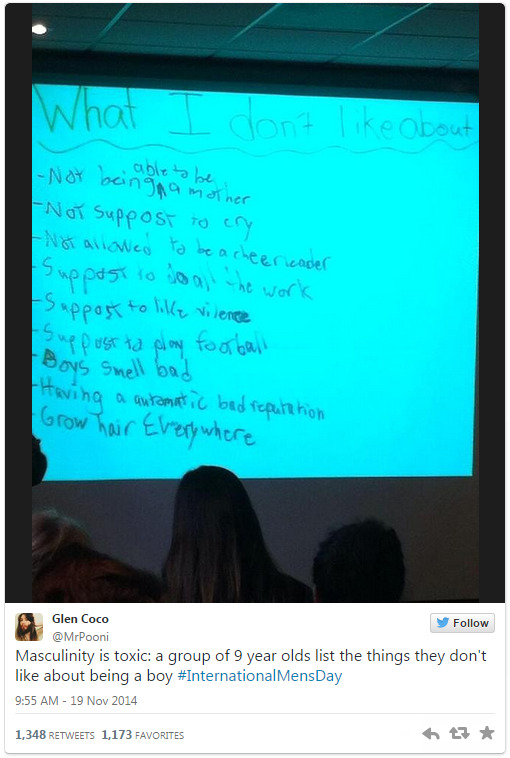
Oldie but goodie: As Twitter user @MrPooni points out, this is worth a reshare today.
The list of what 9-year-old boys don’t like about being boys:
Not being able to be a mother
Not supposed to cry
Not allowed to be a cheerleader
Supposed to do all the work
Supposed to like violence
Supposed to play football
Boys smell bad
Having “a automatic bad reputation”
"Grow hair everywhere"
Gender norms are the worst. So is growing hair everywhere, I guess. (h/t BuzzFeed)
24K notes
·
View notes
Photo

East German teens drape their nation’s flag over their backs to show their support for the collapsing country, and disagreement with the upcoming reunification with the west. Not everyone was so happy to see that wall come tumbling down.
5K notes
·
View notes


